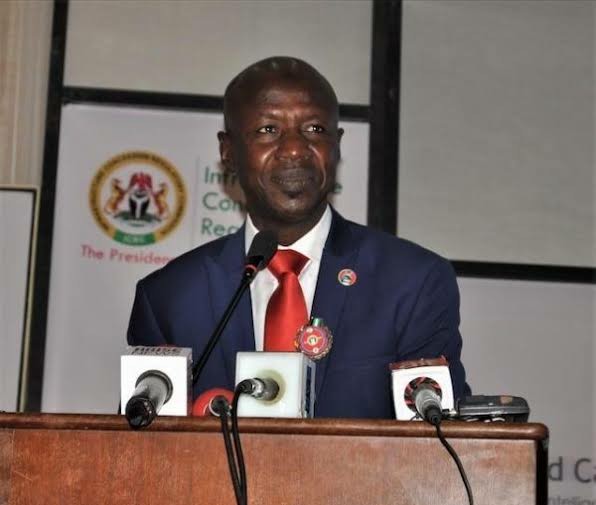The suspended acting chairman of the Economic and Financial Crimes Commission (EFCC), Ibrahim Magu has said he didn’t convert recovered stolen assets to his personal use.
The panel submitted its report to President Muhammadu Buhari on Friday, recommending the sack and prosecution of Magu as well as the appointment of a new chairman from outside the police force.
There is yet no statement from the presidency on the report or any indications of when the white paper will be made public.
In his reply to the allegations made against him by Abubakar Malami, the attorney-general of the federation, which TheCable secured from a member of the panel, Magu maintained that he did not divert any recovered assets during his tenure as alleged.
Magu went into details of how recovered assets were managed “in line with the EFCC (Establishment) Act, 2004”.
EFCC’s recovery modality has come under the searchlight, with the federal government now proposing a different body to manage the assets.
As things stand, EFCC makes recovery directly to all victims of financial crimes — including state and local governments.
Private individuals, including foreign nationals, who were victims of fraudsters benefited from the recoveries, according to Magu.
Federal government institutions such as the Nigerian National Petroleum Corporation (NNPC), Federal Inland Revenue Service (FIRS), the Nigerian Ports Authority (NPA), the Revenue Mobilisation Allocation and Fiscal Commission (RMFAC) and the Nigerian Maritime Administration and Safety Agency (NIMASA) also benefited from the recoveries, Magu added.
Because recoveries made to these entities do not pass through the dedicated recovery account but directly to the fraud victims, Magu maintained that any finding emerging from the content of the recovery account cannot be conclusive.
Magu contented that these recoveries, as well as the foreign exchange component which were paid into dedicated accounts at the Central Bank of Nigeria (CBN), were not captured in the report of the Presidential Committee on Audit of Recovered Assets (PCARA) that audited EFCC’s assets between 2015 and 2018.
Let Zebra News help your business/brand reach a wider audience. Advertise with us today! Contact Our Marketing Team; Tel: 08062622328, 07083662767. Email: zebranewsng@gmail.com















![Queen Fadojutimi Rachael Emerges 2022 Miss Ekimogun, As Mr Nigeria International, Others Act As Judges [PHOTOS]](https://zebranewsonline.com/wp-content/uploads/2022/12/IMG_20221204_205523-218x150.jpg)
































![Film Maker Seunmanuel Faleye Frowns At Religious Violence In Nigeria As Deeper Truth Premieres In Lagos [Photos]](https://zebranewsonline.com/wp-content/uploads/2018/08/Seunmanuel-Faleye-Zebra-News-100x70.jpg)


